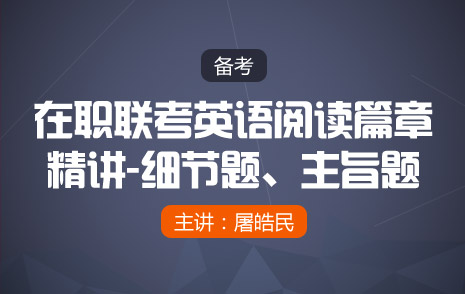2014-08-30 09:21:00 来源:网络发表评论
 在职联考准考证打印
在职联考准考证打印
备考辅导:英语备考策略和技巧 联考英语翻译备考策略 2015在职硕士考试经验技巧
GCT考试: GCT英语备考辅导 GCT数学备考辅导 GCT语文备考辅导 GCT逻辑备考
公共管理: 公文写作范文汇总 2015年在职MPA管理学案例材料 人力资源营销新论
艺术硕士: 艺术硕士艺术概论资料汇总 艺术硕士复习试题|答案 艺术硕士备考知识点
Imagine a world in which there was suddenly no emotion—a world in which human beings could feel no love or happiness, no terror or hate. Try to imagine the consequences of such a transformation. People might not be able to stay alive: knowing neither joy nor pleasure, anxiety nor fear, they would be as likely to repeat acts that hurt them as acts that were beneficial. They could not learn: they could not benefit from experience because this emotionless world would lack rewards and punishments. Society would soon disappear: people would be as likely to harm one another as to provide help and support. Human relationships would not exist: in a world without friends or enemies, there could be no marriage, affection among companions, or bonds among members of groups. Society's economic underpinnings (支柱) would be destroyed: since earning $10 million would be no more pleasant than earning $10, there would be no incentive to work. In fact, there would be no incentives of any kind. For as we will see, incentives imply a capacity to enjoy them.
In such a world, the chances that the human species would survive are next to zero, because emotions are the basic instrument of our survival and adaptation. Emotions structure the world for us in important ways. As individuals, we categorize objects on the basis of our emotions. True, we consider the length, shape, size, or texture, but an object's physical aspects are less important than what it has done or can do to us—hurt us, surprise us, anger us or make us joyful. We also use categorizations colored by emotions in our families, communities, and overall society. Out of our emotional experiences with objects and events comes a social feeling of agreement that certain things and actions are "good" and others are "bad", and we apply these categories to every aspect of our social life—from what foods we eat and what clothes we wear to how we keep promises and which people our group will accept. In fact, society exploits our emotional reactions and attitudes, such as loyalty, morality, pride, shame, guilt, fear and greed, in order to maintain itself. It gives high rewards to individuals who perform important tasks such as surgery, makes he roes out of individuals for unusual or dangerous achievements such as flying fighter planes in a war, and uses the legal and penal (刑法的) system to make people afraid to engage in antisocial acts.
1.The reason why people might not be able to stay alive in a world without emotion is that____.
A.they would not be able to tell the texture of objects
B.they would not know what was beneficial anti what was harmful to them
C.they would not be happy with a life without love
D.they would do things that hurt each other's feelings
2.According to the passage, people's learning activities are. possible because they____.
A.believe that emotions are fundamental for them to stay alive
B.benefit from providing help and support to one another
C.enjoy being rewarded for doing the right thing
D.know what is vital to the progress of society
3.It can be inferred from the passage that the economic foundation of society is dependent on____.
A.the ability to make money
B.the will to work for pleasure
C.the capacity to enjoy incentives
D.the categorizations of our emotional experiences
4.Emotions are significant for man's survival and adaptation because____.
A.they provide the means by which people view the size or shape of objects
B.they are the basis for the social feeling of agreement by which society is maintained
C.they encourage people to perform dangerous achievements
D.they generate more love than hate among people
5.The emotional aspects of an object are more important than its physical aspects in that they____.
A.help society exploit its members for profit
B.encourage us to perform important tasks
C.help to perfect the legal and penal system
D.help us adapt our behavior to the world surrounding us
参考答案:B C C B D
 已帮助8878人
已帮助8878人
| GCT | 【特训】2015年GCT英语全程专项特训班 | ¥980 | 免费试听 |
| 【特训】2015GCT语文全程专项特训班 | ¥400 | 免费试听 | |
| 【特训】2015年GCT数学全程专项特训班 | ¥680 | 免费试听 | |
| 【特训】2015年GCT逻辑全程专项特训班 | ¥400 | 免费试听 | |
| 联考英语 | 【提高】2015年联考英语技巧提高班 | ¥680 | 免费试听 |
| 【冲刺】2015年联考英语冲刺抢分班 | ¥680 | 免费试听 | |
| 法律硕士 | 【全程】2015法律硕士专业综合全程 | ¥880 | 免费试听 |
| 工商管理 | 写作专项零基础班数学专项逻辑专项 | ||
| 专项班 | 公共管理会计硕士教育硕士艺术硕士 | ||
版权及免责声明
1,"新东方在线"上的内容,包括文章、资料、资讯等, 本网注明"稿件来源:新东方在线"的,其版权 均为"新东方在线"或北京新东方迅程网络科技有限公司所有 ,任何公司、媒体、网站或个人未经授权不得转载、链接、转贴或以其他方式使用。已经得到 "新东方在线"许可 的媒体、网站,在使用时必须注明"稿件来源:新东方",违者本网站将依法追究责任。
2, "新东方在线" 未注明"稿件来源:新东方"的 文章、资料、资讯等 均为转载稿,本网站转载出于传递更多信息之目的,并不意味着赞同其观点或证实其内容的真实性。如其他媒体、网站或个人从本网站下载使用,必须保留本网站注明的"稿件来源",并自负版权等法律责任。如擅自篡改为 " 稿件来源:新东方 " ,本网站将依法追究其法律责任。
3,如本网转载稿涉及版权等问题,请作者见稿后在两周内与新东方在线联系。

 w
12分56秒
w
12分56秒